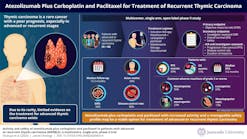Veracyte, Inc. announced new data showing that its whole-genome sequencing (WGS)-based platform for minimal residual disease (MRD) testing detected cancer in patients treated for muscle-invasive bladder cancer (MIBC).
The findings, from the large, independent, multicenter, interventional TOMBOLA trial (NCT04138628), were shared in an oral presentation at the 40th Annual European Association of Urology Congress (EAU25) in Madrid by Iver Nordentoft, Ph.D., Aarhus University (Abstract A0162: “Comparison of ctDNA detection methods for monitoring minimal residual disease in patients with bladder cancer: Insights from the TOMBOLA Trial”).
The new study involved 100 patients enrolled in the TOMBOLA trial who had MIBC and were undergoing standard-of-care neoadjuvant chemotherapy (NAC) and radical cystectomy (RC). Their blood samples were evaluated for circulating tumor DNA (ctDNA) using both ddPCR-based and Veracyte’s WGS-based MRD testing platform to detect disease recurrence. Patients also underwent imaging. At the 6-month milestone, in comparison to ddPCR, the Veracyte MRD testing platform had an equivalent and outstanding negative predictive value (95.9% Veracyte MRD vs. 96.2% ddPCR) for cancer recurrence, while having a higher specificity (88% Veracyte MRD vs. 62% ddPCR). Longer follow-up is required to determine the clinical impact of these results. The findings also showed that the Veracyte MRD testing platform detected cancer recurrence a median of 93 days sooner than imaging. In the ongoing trial, ctDNA-positive patients are treated with immunotherapy and followed for clinical response.
Veracyte’s MRD testing platform utilizes a combination of whole-genome sequencing and artificial intelligence (AI) to provide fast and accurate detection of residual cancer in a patient’s blood sample. This approach requires less blood and offers faster results, compared to ctDNA testing that uses bespoke panels. Veracyte’s MRD testing platform characterizes the complete set of cancer mutations in the tumor tissue sample and blood to establish a patient-specific, landmark genomic signature. It then uses whole-genome sequencing and AI to detect that signature in subsequent blood samples, indicating that cancer is present, and to track tumor progression throughout the patient’s treatment and follow-up care. Veracyte plans to launch its first MRD test in muscle-invasive bladder cancer in the first half of 2026, with other cancer indications to follow.





